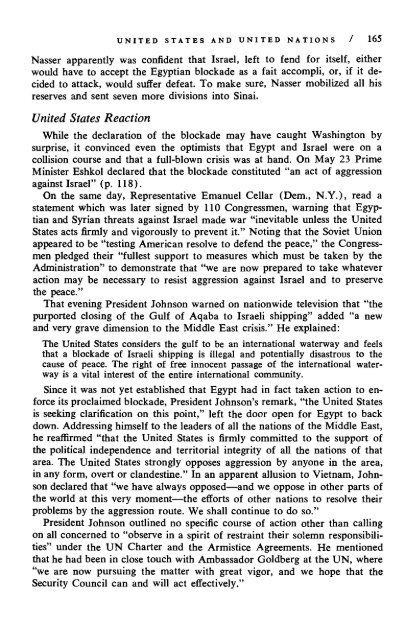1968_4_arabisraelwar
You also want an ePaper? Increase the reach of your titles
YUMPU automatically turns print PDFs into web optimized ePapers that Google loves.
UNITED STATES AND UNITED NATIONS / 165<br />
Nasser apparently was confident that Israel, left to fend for itself, either<br />
would have to accept the Egyptian blockade as a fait accompli, or, if it decided<br />
to attack, would suffer defeat. To make sure, Nasser mobilized all his<br />
reserves and sent seven more divisions into Sinai.<br />
United States Reaction<br />
While the declaration of the blockade may have caught Washington by<br />
surprise, it convinced even the optimists that Egypt and Israel were on a<br />
collision course and that a full-blown crisis was at hand. On May 23 Prime<br />
Minister Eshkol declared that the blockade constituted "an act of aggression<br />
against Israel" (p. 118).<br />
On the same day, Representative Emanuel Cellar (Dem., N.Y.), read a<br />
statement which was later signed by 110 Congressmen, warning that Egyptian<br />
and Syrian threats against Israel made war "inevitable unless the United<br />
States acts firmly and vigorously to prevent it." Noting that the Soviet Union<br />
appeared to be "testing American resolve to defend the peace," the Congressmen<br />
pledged their "fullest support to measures which must be taken by the<br />
Administration" to demonstrate that "we are now prepared to take whatever<br />
action may be necessary to resist aggression against Israel and to preserve<br />
the peace."<br />
That evening President Johnson warned on nationwide television that "the<br />
purported closing of the Gulf of Aqaba to Israeli shipping" added "a new<br />
and very grave dimension to the Middle East crisis." He explained:<br />
The United States considers the gulf to be an international waterway and feels<br />
that a blockade of Israeli shipping is illegal and potentially disastrous to the<br />
cause of peace. The right of free innocent passage of the international waterway<br />
is a vital interest of the entire international community.<br />
Since it was not yet established that Egypt had in fact taken action to enforce<br />
its proclaimed blockade, President Johnson's remark, "the United States<br />
is seeking clarification on this point," left the door open for Egypt to back<br />
down. Addressing himself to the leaders of all the nations of the Middle East,<br />
he reaffirmed "that the United States is firmly committed to the support of<br />
the political independence and territorial integrity of all the nations of that<br />
area. The United States strongly opposes aggression by anyone in the area,<br />
in any form, overt or clandestine." In an apparent allusion to Vietnam, Johnson<br />
declared that "we have always opposed—and we oppose in other parts of<br />
the world at this very moment—the efforts of other nations to resolve their<br />
problems by the aggression route. We shall continue to do so."<br />
President Johnson outlined no specific course of action other than calling<br />
on all concerned to "observe in a spirit of restraint their solemn responsibilities"<br />
under the UN Charter and the Armistice Agreements. He mentioned<br />
that he had been in close touch with Ambassador Goldberg at the UN, where<br />
"we are now pursuing the matter with great vigor, and we hope that the<br />
Security Council can and will act effectively."


